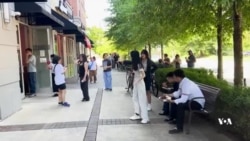ດ້ວຍການເລີ່ມຕົ້ນສົກຮຽນໃໝ່, ນັກຮຽນບາງຄົນເລືອກທີ່ຈະໄປຮຽນທີ່ຕ່າງ ປະເທດ ເພື່ອສຳຜັດວັດທະນະທຳໃໝ່ໆ. ນັກຮຽນອາເມຣິກາບາງຄົນກຳລັງຮຽນ ຢູ່ໃນຈີນ, ແຕ່ຈຳນວນນັ້ນແມ່ນໜ້ອຍກວ່າຈຳນວນນັກສຶກສາຈີນ ທີ່ເຂົ້າມາຮຽນ ໃນມະຫາວິທະຍາໄລອາເມຣິກາຫຼາຍ. ທ່ານນາງ ແຄດເທີຣີນ ໄມໂຄສັນ ເບິ່ງເຫັນວ່າເປັນຫຍັງຄວາມບໍ່ສົມດຸນນີ້ອາດເປັນບັນຫາໄດ້, ພຸດທະສອນ ຈະນຳລາຍລະອຽດມາສະເໜີທ່ານໃນອັນດັບຕໍ່ໄປ.
ຊ່ວງເວລາທີ່ ນາງ ມາຍາ ອັດຊູເລີ ສຶກສາໃນຈີນ ເປັນຊ່ວງເວລາທີ່ລືມບໍ່ໄດ້. ບາງຢ່າງດີ, ບາງຢ່າງກໍ່ບໍ່ສະບາຍໃຈເລັກນ້ອຍ.
ນາງ ມາຍາ ອັດຊູເລີ ກ່າວວ່າ
"ແລະ ດັ່ງນັ້ນ ສາຍຕາທຸກຄົນແມ່ນກຳລັງເບິ່ງມາທີ່ພວກເຮົາ, ນັກຮຽນ ອາເມຣິກັນ..."
ຄຳເຕືອນໃນການເດີນທາງ ແລະ ຄວາມເຄັ່ງຕຶງ ໂດຍລວມລະຫວ່າງ ສະຫະລັດ-ຈີນ ບໍ່ໄດ້ຢຸດ ນາງ ອັດຊູເລີ ຈາກການກ້າວກະໂດດເຂົ້າມາ ເພື່ອເປັນໜຶ່ງໃນນັກຮຽນອາເມຣິກັນພຽງ 700 ຄົນທີ່ສຶກສາໃນຈີນເມື່ອປີກາຍນີ້.
ໃນທາງກົງກັນຂ້າມ, ມີນັກສຶກສາຈີນປະມານ 290,000 ຄົນ ໄດ້ເຂົ້າມາຮຽນ ໃນມະຫາວິທະຍາໄລອາເມຣິກາໃນປີ 2023 ເຮັດໃຫ້ພວກເຂົາເປັນກຸ່ມນັກ ສຶກສາຕ່າງປະເທດທີ່ໃຫຍ່ທີ່ສຸດ. ນີ້ເປັນຂໍ້ມູນຈາກກະຊວງການຕ່າງປະເທດ ສະຫະລັດ, ເຊິ່ງອອກວີຊານັກສຶກສາຕ່າງປະເທດ. ທ່ານ ອາລີ ໄວນ໌ ນັກວິເຄາະຄວາມສຳພັນລະຫວ່າງ ສະຫະລັດ-ຈີນ, ກ່າວວ່າການແລກປ່ຽນ ນັກສຶກສາທີ່ບໍ່ເທົ່າກັນນີ້ເປັນບັນຫາ.
ທ່ານ ອາລີ ໄວນ໌ ກ່າວວ່າ
"ເມື່ອພິຈາລະນາເຖິງຄວາມສຳຄັນຂອງຄວາມສຳພັນທີ່ມີຜົນສະທ້ອນທີ່ສຸດໃນ ໂລກ, ເຈົ້າຕ້ອງການການແລກປ່ຽນລະຫວ່າງນັກຮຽນຫຼາຍຂຶ້ນ ບໍ່ແມ່ນໜ້ອຍ ລົງ, ເຈົ້າຕ້ອງການການແລກປ່ຽນເຫຼົ່ານັ້ນຫຼາຍຂຶ້ນ ແລະ ການແລກປ່ຽນເຫຼົ່າ ນັ້ນເຮັດໃຫ້ເຮົາສາມາດ, ເຂົ້າໃຈພາສາຂອງຄູ່ສົນທະນາຂອງເຮົາ, ເຂົ້າໃຈ ວັດທະນະທຳຂອງຄູ່ສົນທະນາຂອງເຮົາໃນລະດັບພື້ນຖານ."
ແທນທີ່ຈະເລືອກຈີນ, ນັກສຶກສາ ອາເມຣິກັນ ສ່ວນໃຫຍ່ເລືອກທີ່ຈະໄປສຶກສາ ໃນຈຸດໝາຍປາຍທາງທີ່ມີວັດທະນະທຳຄ້າຍຄືກັນຫຼາຍກວ່າ, ເຊິ່ງເປັນແນວ ໂນ້ມທີ່ສະທ້ອນໃຫ້ເຫັນທີ່ວິທະຍາໄລເວວສ໌ລີ ເຊັ່ນກັນ.
ທ່ານນາງ ເຈນນິເຟີ ໂທມັສ-ສຕາກ ຜູ້ອຳນວຍການດ້ານການສຶກສາສາກົນ ຂອງວິທະຍາໄລເວວສ໌ລີ ກ່າວວ່າ
"ຂ້ອຍຮູ້ສຶກວ່າສິ່ງທີ່ເຮົາເຫັນຕັ້ງແຕ່ການແຜ່ລະບາດຄັ້ງໃຫຍ່ ຄືນັກຮຽນຂອງ ພວກເຮົາເບິ່ງຄືວ່າຈະ... ກ້າໜ້ອຍລົງໃນແງ່ຂອງສະຖານທີ່ທີ່ພວກເຂົາຢາກ ຈະເດີນທາງໄປ // ດັ່ງນັ້ນ, ເຮົາກຳລັງເຫັນການລົງທະບຽນຮຽນທີ່ເພີ່ມຂື້ນໃນ ອັງກິດ, ໂດຍສະເພາະຫຼັກສູດທີ່ໄດ້ຮັບຄວາມນິຍົມຫຼາຍທີ່ສຸດຄືຢູ່ທີ່ Oxford, ແລະ ຈາກນັ້ນກໍ່ໃນເດນມາກ."
ບໍ່ຄືກັບນັກສຶກສາຄົນອາເມຣິກາ, ນາງ ເຣເວນ ຫວັງ ນັກສຶກສາຈີນ, ຕັດສິນໃຈໄປສຶກສາໃນປະເທດທີ່ມີວັດທະນະທຳທີ່ແຕກຕ່າງ. ຕອນນີ້ລາວຢູ່ໃນປິທີສາມໃນຖານະນັກສຶກສາຄວາມສຳພັນລະຫວ່າງປະເທດທີ່ ມະຫາວິທະຍາໄລ George Washington, ລາວກ່າວວ່າການສຶກສາໃນ ສະຫະລັດ ເຮັດໃຫ້ລາວໄດ້ສຳຜັດມຸມມອງໃໝ່ໆ, ຕ່າງຈາກສິ່ງທີ່ໝູ່ເພື່ອນ ຂອງລາວໃນຈີນກຳລັງຮຽນຮູ້ຢູ່.
ນາງ ເຣເວນ ຫວັງ ກ່າວວ່າ
"ພວກເຂົາບອກວ່າພວກເຂົາສ່ວນໃຫຍ່ຮຽນກ່ຽວກັບສັງຄົມນິຍົມ, ລັດທິມາກ ຫຼື ທິດສະດິປະເພດນີ້ // ແຕ່ຢູ່ທີ່ນີ້, ມັນແມ່ນຄວາມຈິງ [ຟັງບໍ່ເຂົ້າໃຈ] ທີ່ພວກເຮົາ ກໍ່ຮຽນເລື່ອງປະຊາທິປະໄຕ, ເຮົາກໍ່ຍັງຮຽນຮູ້ເລື່ອງທຶນນິຍົມ, ແຕ່ເຮົາບໍ່ໄດ້ຮຽນ ພຽງແຕ່ (ທິດສະດີເຫຼົ່ານັ້ນ) ຢູ່ທີ່ນີ້, ແຕ່ຂ້ອຍຄິດວ່າພວກເຂົາພະຍາຍາມຢ່າງ ດີທີ່ສຸດທີ່ຈະໃຫ້ການສຶກສາທີ່ບໍ່ລຳອຽງ (ບໍ່ມີອະຄະຕິ) ແກ່ພວກເຮົາ."
ນາງ ອັດຊູເລີ ກ່າວວ່າປະສົບການຂອງລາວໃນຈີນທ້າທາຍສົມມຸດຕິຖານຂອງລາວ.
ນາງ ມາຍາ ອັດຊູເລີ ກ່າວວ່າ
"ກ່ອນທີ່ຂ້ອຍຈະໄປຈີນ, ຂ້ອຍຄິດວ່າຈີນເປັນຄືຂຸມທີ່ຂໍ້ມູນບໍ່ສາມາດເຂົ້າໄປໄດ້ ແລະ ຜູ້ຄົນຖືກໃສ່ໂຄສະນາຊວນເຊື່ອທີ່ແຕກຕ່າງກັນໄປ ແລະ ໂດຍທົ່ວໄປ ແລ້ວຖືກກົດຂີ່ຫຼາຍ, ເຊິ່ງໃນບາງລະດັບກໍ່ເປັນຄວາມຈິງ. ແຕ່ເຈົ້າຮູ້ບໍ່, ຫຼັງຈາກໄປຈີນ ແລະ ໄດ້ສຳຜັດກັບຊີວິດບ່ອນນັ້ນ, ມັນປ່ຽນແປງຄວາມຄິດນັ້ນ ໄປຫຼາຍ, ມັນບໍ່ແມ່ນແບບນັ້ນຢ່າງແນ່ນອນ."
ນາງ ອັດຊູເລີ ປາດຖະໜາທີ່ຈະກັບໄປຈີນໃນອະນາຄົດ...
... ໃນຂະນະທີ່ ນາງ ຫວັງ ກ່າວວ່າລາວວາງແຜນທີ່ຈະຫາວຽກເຮັດໃນ ອາເມຣິກາ ຫຼັງຈາກຮຽນຈົບ.
ອ່ານລາຍງານນີ້ເປັນພາສາອັງກິດ
Maya Altschuler’s time studying in China was unforgettable. Some good, some a bit uncomfortable.
“And so all eyes were kind of on us, the American students…”
Travel advisories and overall U.S.-China tensions didn’t stop Altschuler from taking the leap to become one of just 700 American students studying in China last year.
In contrast, about 290,000 Chinese students attended American universities in 2023 making them the largest international student group. This is according to the U.S. State Department, which issues international student visas. This unequal student exchange is problematic, says U.S.-China analyst Ali Wyne.
“Given the stakes of the world’s most consequential bilateral relationship, you want more student-to-student exchanges not fewer, you want more of those exchanges and it’s those exchanges that allow us to, at a very basic level, gain an understanding of our interlocutors’ language, gain an understanding of our interlocutors’ culture.”
Instead of opting for China, the majority of American students are choosing to study in more culturally similar destinations, a trend also reflected at Wellesley College.
“I feel like what we’ve seen since the pandemic is our students are a little more, little less adventurous in terms of where they would like to travel // So, we’re seeing kind of even increased enrollments in the U.K. in particular, probably the most popular programs are in Oxford, and then in Denmark.”
Unlike her American counterparts, Chinese student Raven Wang, made the decision to study in a culturally different country. Now in her third year as an international relations student at George Washington University, she says her education in the U.S. exposed her to new perspectives, unlike what her friends in China are learning.
“They said like they mostly learn about like socialism, like Marxism, or like these kind(s) of theories. // But in here, yes that’s true [unintelligible] we also learn democracy we also learn capitalism, but we don’t only learn about (those theories) here, but I think they try their best to do unbiased studying to us.”
Altschuler says that her experiences in China challenged her assumptions.
China was kind of this hole where information didn't go in and people were fed all this different propaganda and generally were very oppressed, which on some level is true. ((end courtesy)) But you know, after going to China and ((MANDATORY COURTESY: Maya Altschuler)) sort of experiencing some of the life there, it's changed that a lot. It's definitely not.”
Altschuler wishes to return to China in the future…
…while Wang says she plans to find work in America after graduation.







ຟໍຣັມສະແດງຄວາມຄິດເຫັນ